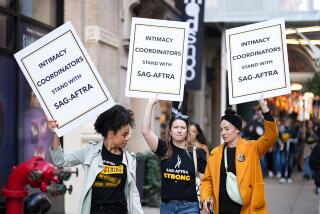ACLU Attacks Code Backed by Mahony : Entertainment: Civil rights organization says religious groups are seeking a return to the moral rules of the 1950s for films, TV.
- Share via
The American Civil Liberties Union, responding to Cardinal Roger M. Mahony’s call for the entertainment industry to consider a new motion picture and television code, launched an anti-censorship campaign and petition drive Thursday urging the industry not to give in.
In a full-page advertisement in the trade publication Daily Variety, the ACLU lambasted the proposed code, calling it “a list of moral rules that would return us to the 1950s.” The ad pictured actors Mary Tyler Moore and Dick Van Dyke in a scene from the television comedy “The Dick Van Dyke Show.”
“What! Back to Separate Beds?” the ad asked, referring to the bedroom furnishings of Rob and Laura Petrie, the married couple that Van Dyke and Moore portrayed. “What if all movie and television shows needed a church seal of approval before they were ever made? . . . The only way to stop attacks on free speech is to speak out!”
In a news conference, Ramona Ripston, executive director of the ACLU of Southern California, described the campaign as an attempt to defend artistic freedom. She urged the public to mail the petition printed in the ad, which asks Mahony and Ted Baehr, author of the code, to withdraw it.
Last week, Baehr, chairman of the Atlanta-based Christian Film and Television Commission, unveiled his 19-page proposal at a seminar sponsored by the Los Angeles archdiocese. He described it as an updated version of the Hays Code, which set forth general standards of taste that were strictly adhered to in Hollywood from 1933 to 1966.
The code would forbid, among other things, nudity, suggestive dancing, lustful kissing and the portrayal of law enforcement officers dying at the hands of criminals.
Mahony, who appeared with Baehr at last week’s seminar, stopped short of calling for mandatory compliance with the code. But he said the industry’s voluntary adoption of the document would be one antidote to what he called Hollywood’s persistent glorification of evil.
Mahony was out of town Thursday, but a spokesman for the archdiocese said the ACLU’s ad is a fund-raising gimmick that has misrepresented the cardinal’s position.
“Cardinal Mahony never said anything about a church seal of approval,” said Father Gregory Coiro, noting that the ad solicits readers to donate $20 and become ACLU members. “I’m disappointed that what I thought was a reputable organization had to resort to lies and half-truths to raise money.”
Reached at his home in Atlanta, Baehr agreed, calling the ad “specious” and accusing the ACLU of “creating a whipping boy to raise funds.”
“They know very well that the points raised in the ad don’t have anything to do with what we said,” said Baehr, who disputed the ACLU’s charge that he wants to censor movies. “Censorship is prior restraint. If we mandated these points, that would be censorship. Not only are we not mandating these points, but we are not even seeking to mandate them. You don’t have to pay one bit of attention to us.”
But Ripston said that even a voluntary code is cause for concern.
“When you throw the strength and the reputation of the Catholic Church behind it, it’s going too far,” Ripston said.
“What Sen. McCarthy did in the ‘50s was not inscribed in law anywhere. We just want to be careful that we don’t go back to those days.”
Religious leaders were not the only ones who noted inaccuracies Thursday in the ACLU’s ad. Jackie Becher, Moore’s publicist, said the ad was incorrect in its assertion that the photograph of Moore and Van Dyke was reprinted with Moore’s permission. Becher also could not confirm Ripston’s assertion that the actress was very enthusiastic about the anti-censorship campaign.
“Mary was not available and did not give her permission and they went ahead and used it,” Becher said. “I hadn’t been able to get back to them, yes or no.”
A spokesman for Van Dyke confirmed that he had approved use of the photograph, but said it was not clear whether he had endorsed the ACLU’s campaign.
In addition to the petition, the ACLU is distributing Anti-Censorship Action Kits, which include sample letters to members of Congress and industry executives such as Jack Valenti, president of the Motion Picture Assn. of America. Valenti has been an outspoken opponent of the proposed code.
“If people are not vigilant . . . the industry could give in,” Ripston warned. “It is good for them to know there are people supporting their efforts.”
More to Read
The biggest entertainment stories
Get our big stories about Hollywood, film, television, music, arts, culture and more right in your inbox as soon as they publish.
You may occasionally receive promotional content from the Los Angeles Times.










